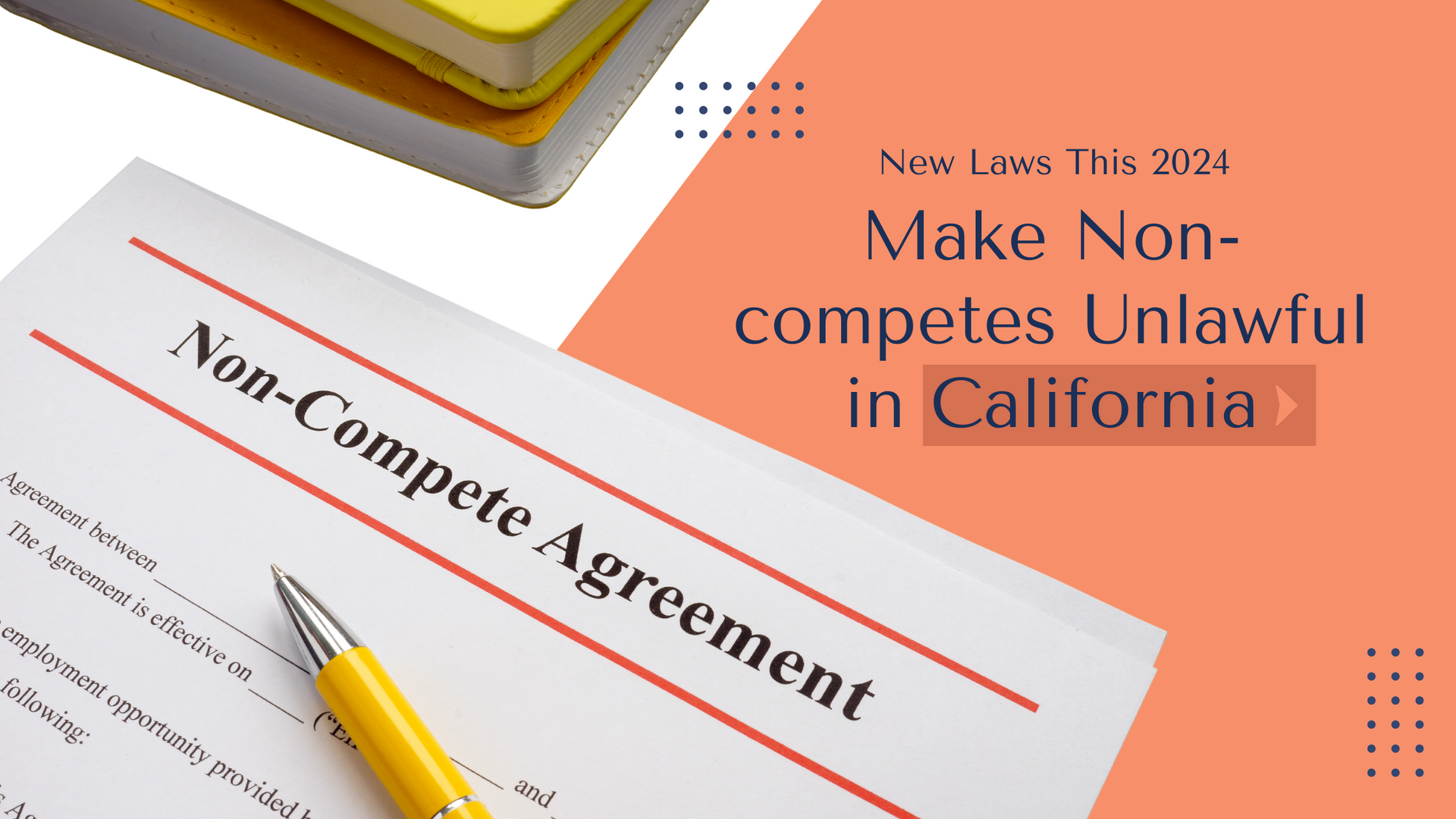Previous Legislation
Throughout California’s history, the law has declared non-compete agreements void for the benefit of fair competition. These regulations invalidate contractual clauses that restrict an individual from participating in a legal profession, trade, or any business with very few specific exceptions, which are the following:
- When the employee sells business goodwill.
- When the business owner sells their business interest.
- When the business owner sells all operating and goodwill assets.
While state labor law provides these narrow exceptions to the ban on non-compete agreements, for most employment agreements between businesses and individual employees, the law is straightforward:
a company cannot restrict you from working in a specific geographic area, for a designated period, or for a competitor.
Crucially, this prohibition on non-compete agreements safeguards individuals working in California, even if the company is based in a different state where such agreements are legally enforceable.
New Legislation
AB 1076:
Current legislation renders void any contractual provisions restraining a person from engaging in a lawful profession, trade, or business, with certain exceptions. Existing law voids noncompete agreements in employment contexts and clauses within employment contracts, even if narrowly tailored unless exceptions apply.
The new legislation provides that invalidating noncompete contracts should be broadly interpreted. It looks to render void any noncompete agreement or clause in an employment contract, regardless of how specifically crafted, except for the cases mentioned above. The bill confirms current law and broadens its application to contracts where the person subjected to restrictions didn't directly participate in forming the contract.
Furthermore, the bill deems it unlawful to include a noncompete clause in an employment contract or require an employee to enter a noncompete agreement without satisfying specified exceptions. Employers must notify current and former employees in writing by February 14, 2024, that the noncompete clause or agreement is void. Violation of these provisions constitutes an act of unfair competition under the Unfair Competition Law (UCL).
SB 699:
This new legislation declares any contract void under the law unenforceable, irrespective of where or when the contract was executed. It explicitly prohibits employers, regardless of whether the contract was signed, or employment was maintained outside of California, from attempting to enforce such contracts.
Additionally, the bill bars employers from entering contracts with employees or prospective employees that hold provisions voided by this newest law. Violating this provision constitutes a civil offense. The legislation empowers employees, former employees, or prospective employees to take legal action for injunctive relief or the recovery of actual damages, with prevailing parties entitled to reasonable attorney's fees and costs.
What Does it Mean for Workers?
Employees, former employees, and prospective employees have the authority to pursue injunctive relief, actual damages, or both under this law. Additionally, prevailing plaintiffs are eligible to recover reasonable attorneys' fees and costs. However, it's important to note that under the new law, employers who succeed in litigation involving restrictive covenants are not granted the right to recover their fees from the individuals who lose the case. Both employers and employees connected to California are recommended to assess their agreements in consideration of this recent legislation.
Moreover, any employees who have signed a non-compete agreement or have a non-compete clause in their contract must have received a written and personalized notice of the unlawfulness of this document from their employer or former employer by February 14th, 2024, or else they can pursue legal action against their employer or former employer if this one tries to enforce it.
Given the changes in Californian law, is essential for both employees and employers to stay informed on 2024 employment laws. By staying informed, both employers and employees can contribute to a thriving and inclusive labor market in the Golden State.
If you or someone you know has signed a non-compete in or with a California,
consult with LFECR, an experienced employment law firm that can provide guidance, support, and legal representation to help you pursue justice and hold your former employer accountable for their actions.
Our experienced labor rights lawyers at Lawyers for Employee and Consumer Rights are here to guide you toward a resolution that upholds your rights and dignity.
Call
844-619-7541 today for a free and confidential consultation to get the help you need and deserve.
Frequently Asked Questions
1. Does this mean non-compete agreements are completely illegal in California now?
Yes. As of January 1, 2024, most non-compete agreements are not just unenforceable but
unlawful in California. With very limited exceptions, employers cannot require, include, or attempt to enforce non-compete clauses against employees, former employees, or prospective employees.
2. What if I signed a non-compete years ago or in another state?
It does not matter when or where the agreement was signed. Under the new California laws, non-compete agreements are void and unenforceable if they restrict work connected to California, even if the employer is based elsewhere or the contract was signed outside the state.
3. Can my employer still threaten legal action if I go work for a competitor?
No. Employers are prohibited from attempting to enforce unlawful non-compete agreements. Doing so may expose them to legal liability, including claims for damages, injunctive relief, and attorney’s fees under California’s unfair competition laws.
4. Are there
any situations where a non-compete is still allowed in California?
Yes, but they are very limited. Non-compete clauses may still be valid in specific business-sale situations, such as when someone sells the goodwill of a business or their ownership interest. These exceptions generally do not apply to regular employees.
5. What happens if my employer failed to notify me that my non-compete is void?
Employers were required to notify current and former employees in writing by February 14, 2024, that any non-compete clauses are void. Failure to do so may give employees grounds to pursue legal action, especially if the employer later attempts enforcement.
6. Can prospective employees in California take legal action over unlawful non-compete clauses?
Yes. The new laws protect not only current and former employees but also prospective employees. If an employer includes an unlawful non-compete in an offer or employment contract, the affected individual may seek injunctive relief or damages.
7. Should I sign an employment agreement if it still contains a non-compete clause?
You should proceed with caution. Even though the clause may be unenforceable, its inclusion could signal broader compliance issues. Consulting an employment attorney before signing can help protect your rights and clarify whether the agreement violates California law.






